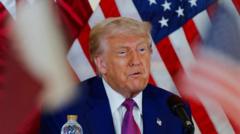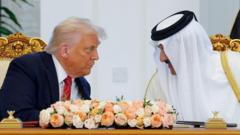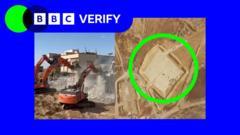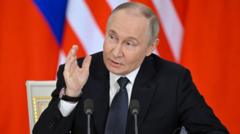In a remarkable shift from conventional U.S. foreign policy, President Trump advocates for a self-sufficient Middle East, marking a new era in diplomatic relations.
Trump's Revolutionary Stance in the Middle East: A Shift in U.S. Diplomacy

Trump's Revolutionary Stance in the Middle East: A Shift in U.S. Diplomacy
As Trump visits the Middle East, he emphasizes non-intervention and regional autonomy.
In a lavish ballroom in Saudi Arabia, President Trump delivered a significant address that could reshape U.S. engagement in the Middle East. Calling for an end to nation-building, foreign interventions, and unsolicited "lectures on how to live," Trump empowered the region’s citizens to define their own paths.
His remarks were met with a quick array of reactions across the Middle East and came amid a four-day trip through Saudi Arabia, Qatar, and the UAE, where he focused on both business collaborations and larger geopolitical strategies. During his visit, Trump also held a historic meeting with Syrian President Ahmed al-Shara, marking the first U.S.-Syria leadership dialogue in a quarter-century. Trump notably commended al-Shara, referring to him as a "strong past" fighter, reflecting a willingness to engage with leaders once considered adversaries.
On the business front, Trump announced a landmark agreement with Qatar Airways for the purchase of 210 Boeing jets, alongside a new defense cooperation pact between the U.S. and Qatar. These agreements represent a significant strengthening of economic ties in the region.
Meanwhile, tensions continue to mount in Gaza, where Israeli airstrikes have reportedly claimed the lives of dozens of Palestinians. This escalation raises critical questions about the safety of Hamas leader Muhammad Sinwar, whose fate remains uncertain amid the ongoing conflict.
As this complex narrative unfolds, the world watches closely, considering the implications of Trump’s transformative diplomatic approach in a region marked by longstanding strife and discord.





















